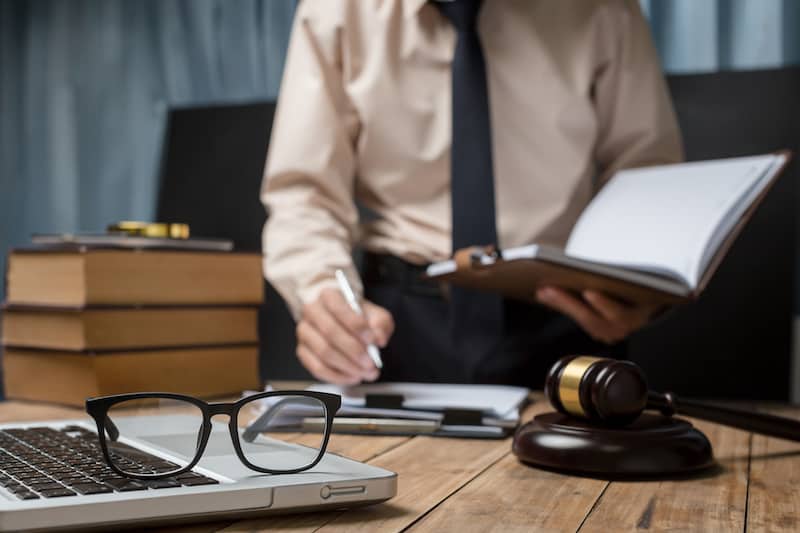
22 Dec What Is A Deposition? Everything You Need to Know About Depositions
Whether you’re an individual finding yourself in court for the very first time or a sophisticated businessperson used to the process of deposition, legal proceedings can be confusing and stressful. A deposition often is fundamental to building your legal case but can pose its own set of hurdles. If you are preparing for a deposition, we encourage you to keep reading for general guidance and tips on having your deposition taken.
What is a deposition? A deposition is an oral statement of a witness taken under oath. It is used to gather information as part of the pre-trial discovery, or investigation, process and in some cases may be used at trial. A witness being deposed is called a “deponent.”
If you’re a plaintiff being deposed, a defendant, or even just a witness in a civil lawsuit, there’s a good chance that you will have to submit to a deposition at some point. A deposition is set up by an attorney for one of the parties to a lawsuit that demands the sworn testimony of the opposing party (defendant or plaintiff), a witness to an event, or an expert intended to be called at trial by the opposition.
If the person requested to testify is a party to the lawsuit–either the plaintiff or the defendant–notice of the time and place the deposition will occur can be given to the opposing side’s attorney. If a witness is an independent third party, an expert perhaps, then a subpoena must be served if he/she is reluctant to testify.
Everything You Need to Know About Depositions
Because the majority of people have not participated in a deposition, it can cause great confusion and stress. Let’s take a closer look at the purpose of a deposition.

A legal deposition has two purposes:
- To find out what the witness knows.
- To document a witness’s testimony.
In What Types of Cases are Depositions Used?
A deposition is used in both civil and criminal court cases before a trial occurs, but it’s more of a common component in civil lawsuits. A majority of states allow criminal depositions when a judge has concluded that there’s a good chance that an important witness will be unable to testify at trial. Only a handful of states allow depositions in criminal cases without the prior approval of a judge.
How is a Deposition Recorded?
A deposition is recorded word-for-word by a court reporter. The reporter is present throughout the session and provides a transcript of the entire testimony. In most cases, the deponent and the court reporter sign an affidavit to certify the transcript is accurate. A deposition can also be videotaped if a deponent is ill and not well enough for trial or if the deponent is out of town or unavailable during the trial.
The Importance of a Deposition
Just as the scene of a crime can be captured in photographs and evidence from a traffic accident can be gathered at the scene then preserved by forensic specialists, so too is a deposition the opportunity to capture, and preserve, the testimony of a witness. Unless someone tampers with physical evidence, evidence in a case rarely changes. With a deposition, the witness or other party can change their testimony many times if not properly deposed. This is a crucial step in the discovery process in any case.
What Should I Wear to a Deposition?
Dress as if you’re actually appearing in front of a judge or jury. Avoid wearing jeans, sneakers, t-shirts, tank tops, shorts, flip-flops, or sandals. First impressions are important and what you wear to a deposition will hopefully establish a good impression on the attorney and their client. The deposition is usually the first time the opposing attorney meets you. Business casual is always a good choice. Choose to dress conservatively rather than flashy.
The Do’s and Don’ts of Giving a Deposition
Here are some important things to keep in mind as you approach your deposition:
- Relax.
- Answer every question truthfully.
- Stick to the facts as you know them.
- Take your time and speak clearly.
- Answer questions audibly, not with a nod of the head or gesture.
- Don’t give your opinion or estimates (of time or distance).
- Never argue, lose your temper, or act aggressively.
- Don’t use profanity.
- Don’t answer a question you don’t understand–ask for an explanation.
- Refuse to make light of the situation.
- Never paraphrase a conversation
- Don’t guess an answer to a question.
Properly given, your testimony can help your attorney effectively manage your case, whether it’s settled or tried in court. How you conduct yourself at your deposition can help, or hurt, your case, depending on your attitude, truthfulness, and appearance.
What Happens Before a Deposition?
Your Oklahoma City lawyer will prepare you ahead of time for your deposition. Typically, he or she will sit down with you and review the important documents. All you need to focus on is telling the truth about everything to the best of your ability.
What Happens During Discovery
In a lawsuit, all parties named have a right to conduct discovery – a formal investigation to find out more about the case. This phase of a case can include many different things. Typically, subpoenas for relevant documents to the case are part of the case’s discovery. Written questions, known as interrogatories, are included in discovery, but one of the most common methods of discovery is to take depositions.
When parties are given access to the facts and evidence of the case, they can better form a legal strategy. In some instances, the facts and evidence uncovered during discovery can help the two opposing parties decide to settle rather than go to trial.
How Long Does a Deposition Take?
The deposition process can take 15 minutes, a week, or longer depending on the case and the importance of the witness.
Is a Deposition Necessary for My Case?
 Cases that involve only legal matters don’t typically require a deposition. Cases that include witness testimony, evidence, and other factual issues may require a deposition or series of depositions to help give a more thorough understanding of the events that took place. A deposition can play a vital role in many types of lawsuits.
Cases that involve only legal matters don’t typically require a deposition. Cases that include witness testimony, evidence, and other factual issues may require a deposition or series of depositions to help give a more thorough understanding of the events that took place. A deposition can play a vital role in many types of lawsuits.
How a Deposition Works
A deposition typically takes place in an attorney’s office. An attorney asks the witness, or deponent, questions about events related to the lawsuit with the entire testimony recorded word-for-word. It isn’t a closed session. If the other party wants to attend the deposition, they’re welcome to be present.
As a deponent, you can bring an attorney with you. The attorney of the deponent can make objections during the deposition, but as a deponent, you’re obligated to answer all of the questions posed to you during a deposition, regardless of objections, since there isn’t a judge present at the testimony.
A deposition is a serious procedure. Everything said during a deposition is considered extremely important. If a deponent provides a false statement during a deposition, he or she could be punished, civilly, or criminally.
What Questions Shouldn’t I Answer?
You can object to any question in a deposition, but if a judge overrules the objection in court, you might be compelled to answer. Questions that don’t have to be answered generally fall into three categories:
- Private information. You have a right to refuse questions about a person’s health, sexuality, or religious beliefs (including your own). The opposing attorney has to explain how your answer might have a direct bearing on the case to compel you to answer.
- Privileged information. Confidential conversations between a patient and a doctor or psychiatrist, an attorney, and his or her client, or confession given to a priest are examples of privileged information.
- Irrelevant information. Questions that don’t have a bearing on the outcome or that are improper may be considered irrelevant. You may object to the question yourself or if one of these questions is answered, your attorney may stop you from answering and object on your behalf.
Before giving a deposition, meet with your attorney so you can be adequately prepared. You’ll want to review applicable statements, photographs, law enforcement reports, and other information about your case. The purpose of a deposition is to provide information, but make sure you answer the non-objectionable questions that are asked.
Tips for a Successful Deposition
We’ve assembled a laundry list of tips and best practices that will help you successfully make it through the process of deposition.
Familiarize yourself with the deposition process.
Understand how a deposition actually works. The information preceding these tips will get you there.
Do your homework.
It is important to prepare for your deposition. Find out the basis of the litigation by reviewing all of the pleadings in the case and what other witnesses and experts have said.
Know what information is privileged.
All conversations between you and your attorney are off-limits. Do not disclose anything your attorney has told you and do not answer questions that ask for this information. Let your attorney object when such questions are asked.
Understand that depositions are not conversations.
Depositions are formal, legal proceedings. You’re not there to help the other side understand your story. Be polite but don’t make small talk. If there isn’t a pending question, remain quiet.
Know that you cannot win your case at the deposition.
Don’t help the other side’s attorney understand your case. Offer as little information as possible while still telling the truth.
Do not joke. Avoid wisecracks and obscenities.
Never indulge in humor when responding to questions in a deposition. Humor may not be recognizable in the transcript and may convey in a negative light.
Don’t interrupt.
Before you answer, let the attorney finish the question to make sure you fully understand it. If you don’t understand the question, say so. Give yourself time to think before answering.
Make eye contact.
Look at the attorney asking you questions.
Be honest.
There’s nothing wrong with admitting you don’t remember or don’t know the answer to a question. You are under oath and rules for perjury apply to depositions. It’s better to be honest and admit your ignorance than to misspeak.
Know the common attorney “tricks”.
The opposing attorney has participated in many more depositions than you and will, therefore, have the advantage. Experience has taught him or her how to trip up deponents–even when you think you have nothing to hide. He or she may present as a buddy to give the idea that the deposition is like chatting over coffee, might be intimidating, or may pause for long periods after your answer.
Each of these scenarios is an attempt to exploit your natural desire to be accepted so that you’ll drop your guard and keep talking. The more you talk, the more you might inadvertently stumble onto something that can help the other side with their case. Answer every question completely but be succinct with your answers.
Answer the question asked.
Resist the urge to jump ahead and answer a question, even if you think you know where the attorney is headed.
Keep it simple.
Try to keep your answers as short as possible. Don’t add detail that isn’t necessary to answer the question that’s been asked. At the same time, you do have the right to answer questions completely. Don’t be intimidated to interrupt an attorney who doesn’t let you speak your piece. Your attorney will assure you are permitted to answer fully.
Be professional.
Maintain a calm, professional, and dignified attitude. The other side’s attorney might try to rattle you but don’t let that happen. Don’t be flippant and don’t get angry or argue. Remember, it’s not personal, it’s business.
 Do not argue.
Do not argue.
You may be a great debater, but do not take on an attorney in a war of words.
Take a break.
If you feel you need to clear your head or collect your thoughts, don’t be afraid to ask for a break. As long as there aren’t outstanding questions you haven’t answered, you can ask for a short break.
Don’t volunteer documents or information.
If you’re asked to supply documents or information, refer the opposing counsel to your attorney. Don’t reach into your pocket for any document, such as a driver’s license, social security card, or any other document unless your attorney requests that you do so.
Rephrase any vague responses.
If you realize you’ve made a mistake or answered a question that could be misinterpreted, you can amend it before your testimony becomes final. If possible, do it before the deposition ends. You’ll also have an opportunity to review the transcript within several weeks of the deposition. Read it and sign it before it’s entered into discovery.
Be clear.
If you’re testifying about a conversation, make it clear whether you’re quoting directly or paraphrasing.
Avoid superlatives and characterizing your answers.
“I never” or “I always” can come back to haunt you. Phrases like “honestly” or “very truthfully” may make the examining attorney suspicious.
Summarize when possible.
The attorney will ask for details if necessary.
Be concise.
When answering, don’t explain your thought process or refer to other facts to explain how you came to an answer.
Be confident.
Don’t let an attorney put words in your mouth. Rephrase the question into a sentence of your own using your own words and don’t accept the attorney’s characterization of personalities, distance, events, time, etc.
Don’t add to your answer.
If you’re finished with an answer and it’s complete and truthful, stay quiet and don’t elaborate on it, even if the examining attorney looks at you in expectation.
There’s no “off the record”.
If you speak to anyone in the deposition room, be prepared for questions concerning the conversation.
Be firm.
If the attorney appears confused about an answer, don’t attempt to educate or clarify unless asked to do so.
Read exhibits before testifying.
Documents are typically used as exhibits at a deposition. If you’re asked about a document, make sure you’ve read it before you testify. Don’t comment about the document except to answer the question that elicits your testimony.
Everyone makes mistakes.
If you realize you’ve made a mistake during the deposition, don’t get upset. It can be corrected as soon as it’s realized if you haven’t signed the transcript.
Stay on guard until the very end.
If the attorney suggests the deposition is almost complete, stay on your toes. The questions forthcoming may be the toughest and potentially damaging to the case.
Be patient.
Your job is not done at the end of the deposition. You will receive a copy of the transcript of your deposition a few weeks after it. It can be tedious to review the entire testimony but it’s a very good idea to do so. You may be asked later for additional documents, information, to provide a declaration, or to testify at trial or arbitration.
The way you conduct yourself during your deposition can make or break your case. Be cooperative, but always be mindful not to volunteer more information than you have to, and remember that you can consult your attorney at any time during the deposition. Be aware that your deposition is being taken to provide your opponent with legal ammunition to use against you at trial.
Are you looking to learn more about depositions? Find more great deposition tips and training here.





